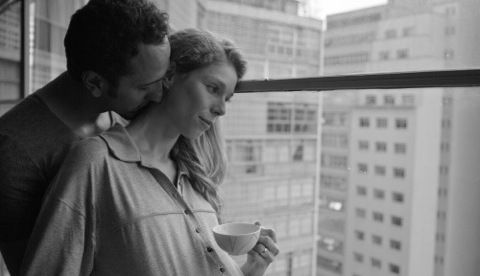Eye For Film >> Movies >> Obra (2014) Film Review
Obra
Reviewed by: Rebecca Naughten

A drama focussed on the secrets unearthed within a family of architects, Obra (a literal translation is 'work' but it can also refer to 'building works') follows Joao Carlos Ribeiro de Almeido Neto (Irandhir Santos) as he sets about living up to his family name with his first major project only to be thrown off course by the discovery of human remains buried under the site. The lot belongs to his family, and although he initially hesitates to probe too deeply into who these people were and what his father and grandfather know of the events that put them haphazardly into the ground, his own imminent fatherhood gradually compels him to resist the cover up that is initiated.
The opening credits set up the basic through-line of the film, that the past may be hidden but it remains underneath waiting to be discovered - a theme underlined by Joao Carlos's wife (Lola Peploe) working as an archaeologist in the centre of the city. Shot in a silvery black and white that at times has the texture of a pencil drawing, Obra's first images show architectural forms gradually appearing in the morning mist, ghost-like structures that slowly accumulate into the form of São Paulo - but those initial shapes and outlines can still be observed within the overall image. Throughout the film, the textures and forms of buildings are contrasted as part of the fabric of a changing city, and the black and white composition captures elements of beauty in even the most rundown corner of the dense urban sprawl.

Director Gregorio Graziosi uses the limits of architectural spaces - doorways, window frames, the edges of walls - to continually create frames within the frame, a very precise and geometrical choice that not only draws attention to the protagonist's trade but also points to the compartmentalisation of his work and private life. Shots are quite often divided either along the vertical (using doorways or the space between pillars) or the horizontal (the strips of frosted glass in a customer service hatch) to highlight the character's obsessive focus at a given moment.
Graziosi and co-writer Paolo Gregori slowly erase the boundaries of Joao Carlos's neatly ordered life by drawing parallels between his beliefs as an architect and events within his family. He is seen early on arguing that buildings that do not fulfil their intended function, or that lower the quality of life for their inhabitants, should be knocked down and remade with better design. But with his wife heavily pregnant - and the impending birth is perhaps an overly obvious contrast to the deaths uncovered at the building site - Joao Carlos begins to shift his position in relation to the question of restoration versus destruction, and maintains an involvement in the restoration of a church despite his father's opposition due to its lack of 'proper' purpose.
The architectural and the familial also combine in the way in which all three generations of men within the family suffer from hernia in their spines (the two older men have scars down their backs from surgery) - the repeated representation of the integral part of the human structure in a weakened and non-functioning state is a suggestive commentary on the foundations of their family. The much-exalted 'legacy' that Joao Carlos's father and grandfather wish to pass on to him seems to be a damaging one - the young architect states that he hopes the hernia is not a legacy that he will pass on to his own son, but the way in which he starts to cut his own path and determinedly dig into the past also suggests that he's intent on allowing his son to start afresh rather than maintaining an unfit structure.
Overall, Obra is as layered as the past it seeks to uncover even if it is ultimately more interested in the architect than the nameless dead. Chilly but beautiful, the film is not only visually impressive but also builds a distinctive soundscape that layers industrial noise into an insistent - and often oppressive - counterweight to the minimal and tranquil spaces that Joao Carlos strives for at both home and work.
Reviewed on: 03 May 2015
















